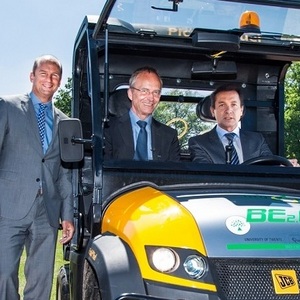BTG develops pyrolysis diesel from wood, tests 25 percent blend

Photo: BTG
June 18, 2013
BY Biomass Technology Group
BTG (Biomass Technology Group), a high-tech company from Enschede, The Netherlands, has developed a process to produce a diesel biofuel from second-generation biomass (not competing with the food chain) that is able to power a vehicle. The vehicle runs on a fuel blend that contains 25 percent of this pyrolysis diesel. Henk Kamp, the Dutch Minister of Economic Affairs, was taken for a ride in this 4-wheel drive vehicle on wood-based pyrolysis-diesel during his visit to Enschede June 10. This test drive, which took place on the University of Twente campus, is part of an initiative of Theo Rietkerk, representative of the Province of Overijssel, within the framework of BE2.O (Bioenergy to Overijssel). BE2.O is a €2.5 million research program in cooperation with the University of Twente which is funded by the Dutch Province of Overijssel. The Minister will take up this challenge with €4 million of support for pyrolysis technology from the Dutch Top Sector Policy Programme. With pyrolysis diesel the company BTG has a world scoop.
Carbon-neutral fuel: In the pyrolysis process wood residues are cracked in a few seconds, which results in a useful oil, a process that takes tens of millions of years in nature. Pyrolysis oil is carbon neutral because of the circular process of the trees and plants the biomass residues origins from. Another important advantage is that no competition with the food chain occurs: pyrolysis oil is second-generation biofuel that, contrary to for example palm oil or ethanol from sugarcane, does not compete with food crops.
In the tank: BTG provides the proof that pyrolysis oil can be blended in a high proportion with fossil diesel. The diesel from pyrolysis oil has been made in the laboratories of BTG. The diesel is a mixture of 25 percent pyrolysis oil from wood and 75 percent ordinary diesel. The pyrolysis diesel was produced within the framework of the BE2.O-programme, in cooperation and coordinated by the University Twente and financed by the Province of Overijssel. In one of the different BE2.O-projects BTG has produced pyrolysis diesel.
Investments in pyrolysis oil: Pyrolysis is one of the core technologies of the Dutch Top Sector Programme. This programme is financed by the private sector and the Ministry of Economic Affairs. Developments in this field proceed quickly. Earlier this year, the new pyrolysis factory in Hengelo (O) has received a subsidy of €4 million from the Top Sector Programme. The European Commission considers pyrolysis as a core technology for second-generation sustainable biofuels as well. At an earlier stage the European Commission has already offered financial support to the pyrolysis factory that should be operational in the fall of 2014.
Advertisement
When do we fill up green diesel? René Venendaal, CEO of BTG, said, “In the by the province supported programme BE2.O—Bioenergy to Overijssel—the first litres of pyrolysis diesel have been produced. With this unique achievement, second-generation diesel is available that is renewable and does not compete with food production. When will we fill up with this diesel at the petrol station? Our cross-country vehicle of BTG runs already on it. Now it is up to the oil companies and authorities to take up this challenge. They can count on the front runners in Overijssel!”
Advertisement
Related Stories
Luxury North Dakota FBO, Overland Aviation—together with leading independent fuel supplier, Avfuel Corp.— on May 19 announced it accepted a 8,000-gallon delivery of sustainable aviation fuel (SAF) on May 12.
Neste and FedEx, the world’s largest express cargo airline, have agreed on the supply of 8,800 metric tons (more than 3 million gallons) of blended Neste MY Sustainable Aviation Fuel to FedEx at Los Angeles International Airport (LAX).
Wheels Up Experience Inc. on May 6 announced the launch of its new SAF program, under which Wheels Up will partner with Delta Air Lines to purchase SAF, allowing private fliers to participate regardless of their flight operator or departure airport.
The USDA reduced its estimate for 2024-’25 soybean use in biofuel production in its latest WASDE report, released May 12. The agency expects soybean oil use in biofuel to increase during the 2025-’26 marketing year.
HutanBio's microalgal biofuel production shown to be net-negative in an independent life cycle assessment by EcoAct
HutanBio on May 8 announced that the production process for its proprietary HBx microalgal biofuel achieves net-negative carbon emissions, based on an independent cradle-to-gate life cycle assessment (LCA) conducted by EcoAct.
Upcoming Events










